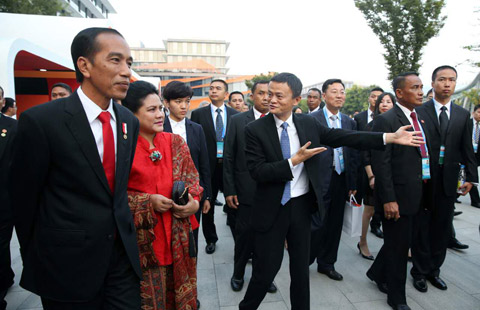'Carbon-neutral' G20 summit shows China's commitment to green growth
(Xinhua) Updated: 2016-09-04 13:25HANGZHOU - The eastern Chinese city of Hangzhou is poised to offer the world the greenest G20 summit through a tree-planting project to offset carbon emissions during the meeting, underlining the country's commitment to green growth.
The project aims to plant more than 22 hectares of trees in the Hangzhou suburbs next spring which, over the next 20 years, are expected to absorb all greenhouse gases discharged during the summit, thus making the Hangzhou gathering the first G20 leaders' meeting to implement the concept of "carbon neutrality."
It also testifies to China's commitment to green growth, an important subject at this year's G20 leaders' meeting, which opens Sunday with the theme of "Toward an Innovative, Invigorated, Interconnected and Inclusive World Economy".
Epitome of green cause
Hangzhou, whose lake-front scenery has inspired generations of painters and poets, has evolved into an epitome of China's endeavors in promoting green growth.
Among its eco-friendly projects, it boasts the world's largest bike share program, with 78,000 bicycles scattered across the city at around 2,700 stations.
"There are so many city bikes that, in the downtown of the city, you cannot go five minutes without seeing one," a citizen said.
Meanwhile, to clean up the environment, the city government has employed modern technologies such as replacing diesel buses with electric ones.
Hangzhou has been replacing diesel buses since 2008. Up to now, official statistics show 22,000 new-energy buses have been deployed on 90 percent of the bus routes in the city. That puts Hangzhou in the vanguard of green energy transportation development.
Thanks to such efforts, Hangzhou, in the first half of 2016, accumulated 123 days of good air quality, and the PM 2.5 concentration declined by 7.7 percent, according to official data.
Green growth agenda
Recognizing its vital significance, G20 economies agreed at their summit as early as in 2009 to phase out subsidies for oil and other carbon dioxide-spewing fossil fuels in the "medium term" as part of efforts to combat global warming.
The pledge was hailed by the international community as a breakthrough, but was lamented for its lack of progress and impetus for years. Hopes are running high that China, host of the G20 summitry for the first time, will give it a boost.
Beijing will make green finance the first time on the G20 agenda to mobilize more investment in environmentally friendly projects. Besides, climate change and other green initiatives are expected to form a major part of the gathering.
John Kirton, co-director of G20 Research Group at the University of Toronto, highlighted green growth as one of the three areas that the world leaders at the summit should coordinate a fiscal stimulus to support.
"If you can do this, you are going to have really big win at the summit," Kirton has told Xinhua.
As a matter of fact, the "green" issue is more burning now than ever, experts said.
The Hangzhou summit comes at a time when the world economy has continued to struggle on the path of fragile recovery despite aggressive monetary policies and rather loose fiscal policies put in place by almost all the world's developed economies to stimulate growth.
Experts said the pursuit of more sustainable green growth reflects the evolving global economic landscape and is in the interests of both the developing and the developed economies in combating the economic downturn.
"While China is looking to the developed countries like those in Europe for green technologies and expertise, the developed economies also expect to take the advantage of their competitive edge in green growth to expand their market," said Sun Yanhong, associate research fellow with the Institute of European Studies of the Chinese Academy of Social Sciences, citing China's cooperation with European economies like Germany, France and Italy.
Meanwhile, the many developing economies need greener growth too, and they need help from the advanced economies to achieve this, experts said.
From agenda to action
To make the green growth initiative feasible, G20 economies have established a study group to clarify the definition, mandate and the scope of green finance, identify challenges faced by green finance and provide voluntary options for countries to consider.
Despite every arrangement, a meeting cannot do much to transform the global economy from brown into a green and low-carbon growth model.
Chen Yulu, deputy governor of the People's Bank of China, said the establishment of a sound green financing mechanism will be a systemic project that requires the coordination among central authorities, local governments, financial institutions and enterprises.
The central authorities will enhance related infrastructure and urge local governments to include green financing into their annual task list while guarding against possible risks to ensure financial stability, Chen pointed out.
To give the "green" agenda a big boost, China announced Saturday, one day ahead of the G20 summit, that it has ratified the emissions-cutting agreement reached last year in Paris.
The ratification will "further advance China's green, low-carbon development and safeguard environmental security," said a proposal adopted at the closing meeting of a week-long bimonthly session of the National People's Congress Standing Committee.
Addressing climate change would help the country realize sustainable development, it added.
Also prior to the summit, China said it will establish a green financing mechanism to facilitate the economy's transition to sustainable growth, becoming the first country worldwide to make such a move.
"Green growth is now part of China's development strategy and the demands for green financing keep growing as China enters a critical period for economic restructuring," said Chen, the bank official.
- AI company calls for global collaboration on industry development
- G20 summit good opportunity for China, other members: expert
- Niu.com launches new scooter
- Tax distribution change causes revenue surge
- China's fiscal reform to reduce local govt deficits: Moody's
- Chinese banking sector reports healthy green credit growth
- New free trade zones back up China's commitment to openness
- Upgrading FTA to deepen, expand cooperation in trade, economy between China, ASEAN

















